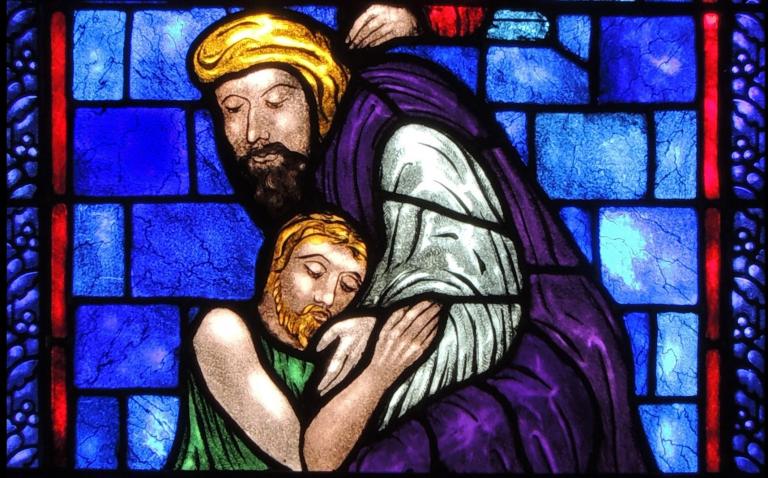
Christian forgiveness is a revolution. It does what revolutions always do: it overthrows the old, decaying order and replaces it with something new. Political revolutions bring change by way of violent struggle, but God’s revolutions bring soul-altering change by way of spiritual renewal.
Forgiveness is a revolution, yes, but only for those who choose to let go of resentment and hatred and live a new life.
In the hands of torturers
Jesus knew what He was doing when He made forgiveness of others a condition for our own forgiveness. In a rather surprising response to Peter’s question about forgiving his brother seven times, the Lord gave us the parable of the “unforgiving servant” which ends with the Master handing that wretch over to torturers until he paid back the last penny. (That is some serious motivation to get out of debt.)
Then comes the kicker: “So will my heavenly Father do to you, unless each of you forgives his brother from his heart” (Mt 18:35).
Really? God will hand us over to torturers if we do not forgive others? Was Jesus being dramatic here or was He saying that forgiveness is vitally important to our Christian lives?
Scholars note that Jesus often used a familiar Semitic verbal tactic – hyperbole – to make His point. Hyperbole proposes exaggerated images to get a message across more effectively than logic or statements.
He usually used emphatic imagery when He knew something would be difficult to accept or would go against the grain of human nature. And clearly, forgiveness is one of those spiritual values that goes against our sinful nature. It is rarely easy to accept or practice.
The power of forgiveness
When visiting my sister some years ago, I listened to her neighbor tell an intriguing story about the death of her mother. The incident was a witness to both the difficulty and life-giving power of forgiveness.
The neighbor said that her mother had a son-in-law who was a completely decadent human being. Over the course of many years, he had committed every possible sin against the family: chronic irresponsibility as a husband and father, drug abuse, total neglect of the welfare of his loved ones, domestic violence, loss of the family home, etc. There was even an accusation of infidelity thrown into the mix.
The neighbor then spoke with great intensity about the end of her mother’s life. The mother was on her deathbed in the hospital and declining. When she seemed to be just hours away from death, she looked up to Heaven and said, “They are not opening the door for me. They won’t let me in.”
The mother did not say who “they” were, but she seemed to be able to see the other side. She had one foot in this life and one in the next, but she could not die just yet. What was keeping her from crossing that threshold?
A couple of days later the family transferred the mother to hospice, but she still lingered, not yet able cross over. When several family members were gathered around her bed, one daughter told the others that she had heard their mother express frustration several times during the dying process: she had real trouble forgiving the wretched son-in-law for all he had done to harm the family.
Caregivers to the dying will tell you that people generally avoid chit chat in their final moments. They focus instead on key issues of concern to them, and the issue of the son-in-law clearly lay on this woman’s soul like a dead weight, pinning her down to earth. To add to the dilemma, the mother was slipping in and out of a coma by that point.
Released from bondage
Another of the daughters finally understood what was binding her mother and immediately called the son-in-law. She made it clear to him that their mother was dying and that he needed to say something to her, even though she was barely coherent at that point.
The daughter put the phone to her mom’s ear (the faculty of hearing is usually the last to go). On the other end of the line, the son-in-law seemed to know what he needed to say. He actually expressed deep regret for all the pain and sorrow he had caused her and her family…and he asked her forgiveness.
The striking thing is that the mother never awoke or even spoke directly to the man, but after the son-in-law was finished speaking, she nodded and mumbled, “Mmmm”, in a gesture that made it clear to all that the message had been received.
Something in her seemed to have been set free at that moment. Her face turned perfectly peaceful, and by the time they hung up the phone, the mother had taken her last breath.
“They” had finally opened the door for her.
Letting go
The verb “to forgive” in the Greek New Testament is the same word used for the actions of “letting go of” (as in a physical object) or “releasing from” (as in a debt). There is something in the etymology of the word that teaches us the truth about forgiveness. The mother experienced the transforming power of forgiveness when she finally let go of all the loathing of her son-in-law that had bound her to this world.
Feelings of resentment accompany every willful injury. No doubt the mother had very good reasons to resent the son-in-law, and we shouldn’t pretend that it was easy for her to find forgiveness in her heart for him.
Yet, there is also a certain sadness that this poor lady lived with the torment of resentment and hatred inside of her for so many years. She didn’t experience the true liberating power of Christ’s forgiveness until the very end of her life.
That emancipating power comes through the act of letting go. It unshackles us and releases us from the bonds of hatred that the Evil One weaves within us to enslave our souls. Forgiveness slices right through them.
In other words, the devil is the real torturer of the parable, and he works on us when we hold on to resentment and other things that hold us spiritually hostage. When we let go of resentment and hatred, we deprive the devil of his power over us.
Forgiveness is a double-edged gift
We can’t overlook the fact that forgiveness had an equally powerful effect on the son-in-law. His release came from his confession of sins and his sincere desire to be reconciled with his mother-in-law. He, too, let go of something: the decades-long torment of his own real guilt. Admitting guilt out loud is an act of letting go. (That is the real genius of the Sacrament of Confession, but we’ll save that for another article.)
Perhaps it was just a momentary sentiment of regret. We do not know if the son-in-law truly changed his ways after that. But we do know that there was one less selfish man in the world that day who had new permission to begin again to be the man God intended him to be.
The remarkable story makes clear that forgiveness is a double-edged gift, a spiritual power effective in liberating both offender and offended. In those cases where only one side forgives or repents, the person who actually lets go receives the benefit of freedom and the other remains a slave. The fact that both offender and offended chose freedom that day shows how powerful the double gift can be.
The difficult part
Back to the difficult part. Letting go always entails the loss of something as well as the profound humiliation and sorrow that often accompanies a loss. But we should not fear losses of this type because they carry within them the values of Christ’s Kingdom.
The beatitudes call “blessed” those who mourn, those who seek righteousness, those who are persecuted and reviled, the meek, the poor in spirit, the peacemakers, and the merciful (Matthew 5:3-12). It’s quite a list of losers.
To this list, of course, we must add those who forgive others and those who ask forgiveness.
To forgive properly, you must be willing to be a loser in the best sense of that word. In the Christian mindset, the one who lets go and takes the loss is the true revolutionary who overthrows the old, dying order of the world.














